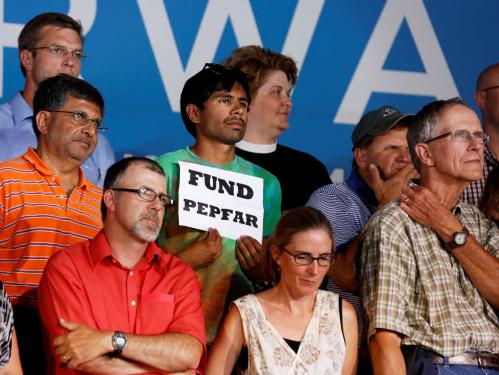Much of today’s backlash against democracy promotion in the Middle East can be traced to the Hamas victory in the Palestinian parliamentary elections of 2006, and its effect of reinforcing the “Algerian nightmare” complex among nervous Washington policy makers about the prospect for political takeovers of Arab countries by illiberal and anti-American Islamist movements.
While many would see Hamas and the Moroccan Justice and Development Party, for example, as occupying two points on a spectrum, I reject this view and reject the notion that Hamas’s victory has much to tell us about the prospects for Islamist behavior in (hypothetical) democratic elections elsewhere in the Arab world. In a recent piece for the Journal of Democracy, I argue for the importance of seeing that there are differences in kind, not just degree, among Islamist movements in today’s Middle East. I describe three distinct categories of Islamists, and focus on the last of the three as the only one from which a potentially democratic Islamist politics might emerge. In evaluating this final category, I argue that the democratic credibility or capacity of a given Islamist movement can only really be tested and assessed in a more open political environment, and that ultimately the quality of Islamist political discourse will hinge on the quality of the political system in which it resides.
Others, however, would argue that these distinctions are not meaningful, on either philosophical or pragmatic grounds. The philosophers might argue, like my friends Hillel Fradkin and Hussein Haqqani, that the common ideological roots of today’s Islamist parties present them all with a rather high bar to clear before they could act as “normal” political factions. This is because their founding ideology doesn’t draw a basic distinction between the Muslim umma and the political state, and thus sets up all kinds of bars to basic principles of democratic politics. Pragmatists, for their part, might say that all Islamist political groups evident in the region today are really some form of hybrid, exhibiting elements of violence and of “normal politics,” and aspects of religious movements alongside of political parties. Even those that don’t engage in violence themselves, they note, either have violent pasts or condone/celebrate the violence of others.
Below I lay out the three categories I describe in the Journal of Democracy.
The first category—and the easiest to dismiss for the purposes of this discussion— comprises the relatively small but important group of radical, ideologically driven movements that we can call takfiri, for their readiness to label other Muslims heretics, apostates, and therefore justifiable targets of violence. Such groups include Al Qaeda, of course, along with its affiliates and allies in Algeria, Iraq, and elsewhere. These groups take no interest in formal politics save for the strict pan-Islamic state that they envision setting up once they have toppled their region’s existing governments. They glorify violence as a religious duty and reject democracy as a violation of God’s sovereignty. Such violently irreconcilable groups are irrelevant to the question of whether Islamist movements can be successfully integrated into a democratic Arab future. The takfiris will endanger that future, just as they endanger the present.
A second category includes what we might call “local” or “nationalist” militant Islamist movements, like Hezbollah in Lebanon, Hamas in Palestine, or the Shiite militias of Iraq. Two characteristics set this type of Islamist movement apart. First, they combine their Islamist ideology with a specific set of local political demands that are the focus of their activity and the core concern of their supporters—unlike the takfiris, they seek and benefit from the vocal support of a given local community. Second, they all exist in weak or failing states (or non-states, in the case of Hamas), where the central government has proved incapable of providing basic security for all its citizens or where the state itself is an arena of contention between competing groups in society. The lack of state capacity enables these movements to wield their weapons with a good deal of support from their local communities. Their armed activities serve not only to advance the ideological cause, but also to protect local constituents from depredation at the hands of the state or communal rivals.
Thinking of Hamas and Hezbollah primarily as Islamist groups rather than as nationalist militants obscures the search for solutions to the problems these groups pose for democratic politics. The fundamental challenge that these groups pose to Arab democratization is their use of violence, not their Islamist character or ideology (although the latter is used to justify the former). Such movements could not have emerged into this dual role of militant political party in a strong state like Egypt; indeed, whenever the Muslim Brotherhood or its offshoots in Egypt developed violent capabilities, the government crushed them mercilessly. Only regimes with insufficient capacity to enforce their monopoly on violence and with weakened capacity in their political institutions are compelled to allow such compromised groups to participate in politics with their weapons in hand. Hamas is a perfect example. According to the formal rules of the Palestinian Authority (PA), Hamas was not qualified to participate in the parliamentary elections because it did not accept the signed agreements with Israel. But the PA could not enforce this rule.
That groups like this choose to run in elections is itself evidence of the extent to which electoral legitimacy is becoming a norm among Arab citizens. A role in formal politics helps the Islamist-nationalists to hedge their bets should they ever need to put away the gun. But they do not view political processes and institutions as authoritative, and have often shown themselves ready to threaten or even use force when it suits them—witness Hezbollah’s takeover of Beirut in May. As long as the region’s Lebanons remain too weak to control its Hezbollahs, there is little hope that full democracy or meaningful equality under law can blossom. States that can barely function or make their writs run throughout their own lands will never be robust candidates for democratic consolidation.
In the strong states that one more often finds in the Middle East, however, the forces of political Islam are a different breed from Hamas and Hezbollah. This third and largest category of Islamist movements—the category most relevant to discussions of democratic change in the Arab world—comprises groups that eschew violence (at least locally) and aspire to a political role in their respective countries, without voicing any revolutionary goals. Such groups may operate as legal parties, such as the Islamic Action Front in Jordan and the Party of Justice and Development in Morocco, or they may be excluded from formal political recognition but still engage in the political process, like Egypt’s Muslim Brotherhood (MB) or Kuwait’s Islamist “societies.” They all want to transform society and government into something more “Islamic,” but aim to do so “from below”—that is, by persuading citizens to adopt Islamist ideas, demand Islamist policies from government, and behave as more closely observant Muslims.
There are, of course, a lot of questions to be raised and discussed about how to assess the democratic “credentials” or relevance of Islamist groups in this third category. But my point in this post is simply that Hamas and Hezbollah are not the same animal as the Egyptian MB, and we should not generalize from one to the other. The 2006 Palestinian elections indeed set back both peace and democracy for Palestinians and Israelis—but those elections have little to tell us about the prospects for Islamist politics elsewhere in the Middle East.
The Brookings Institution is committed to quality, independence, and impact.
We are supported by a diverse array of funders. In line with our values and policies, each Brookings publication represents the sole views of its author(s).


Commentary
Op-edCategories of Islamism
July 30, 2008